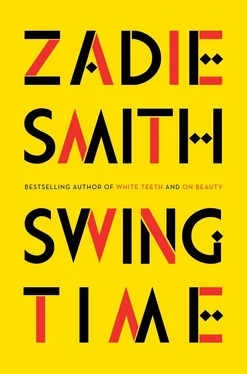Toward the end of that first week I worked out that the preparations for my dinner began moments after my breakfast had been served. But when I tried to approach the corner of the yard where all those women and girls were hunkering in the dust to peel and cut and pound and salt, they laughed at me and sent me back to my leisure, to sit on a plastic chair in my dark room and read the American newspapers I’d brought with me — now crumpled and comically irrelevant — so that I never did discover how, exactly, with no oven and no electricity, they made the oven fries I did not want, or the great bowls of more appetizing rice they cooked for themselves. Food preparation was not for me, nor was washing, or fetching water or pulling up onions or even feeding the goats and chickens. I was, in the strictest sense of the term, good-for-nothing. Even babies were handed to me ironically, and people laughed when they saw me holding one. Yes, great care was taken at all times to protect me from reality. They’d met people like me before. They knew how little reality we can take.
• • •
The night before we were to pick up Aimee I was woken very early, by the call to prayer and the hysterical roosters, and finding that it was not yet insanely hot I got dressed in the darkness and left my compound, alone, without any of the small army of women and children I lived with — as Lamin had insisted I must never do — and went looking for Lamin. I wanted to tell him I was going to the old slave fort today, whether he liked it or not, I was going. As morning broke I found myself followed by many barefoot, curious children—“Good morning, how is your morning?”—like so many shadows, as here and there I paused to say Lamin’s name to the dozens of women I passed, already heading off to work on the communal farm. They nodded and pointed me on, through the scrub, down this path and that, round the bright green concrete mosque half eaten on each side by twelve-foot orange termite hills, past all those dusty front yards that were swept, at this hour, by sullen, half-dressed teenage girls, who rested on their brooms to watch me pass. Everywhere I looked women were working: mothering, digging, carrying, feeding, cleaning, dragging, scrubbing, building, fixing. I didn’t see a man until I found Lamin’s compound, finally, at the outskirts of the village, before the farmland. It was very dark and dank, even by local standards: no front door, only a bed sheet, no huge wooden couch, only a single plastic chair, no floor covering, only earth, and a tin bucket of water with which he must have only recently finished washing himself, for he was on his knees beside it, soaking wet in a pair of football shorts. On the breeze-block wall behind him I could make out the crudely drawn logo of Man United, daubed in red paint. Topless, slender, made only of muscle, skin incandescent with its own youth — flawless. How pale, practically colorless, I looked beside him! It made me think of Tracey, of the many times, as a child, she’d placed her arm next to mine, to check once again that she was still a little paler than me — as she proudly maintained that she was — just in case summer or winter had changed this state of affairs since last she’d checked. I didn’t dare tell her that I lay out on our balcony on any hot day, aiming at exactly the quality she seemed to dread: more color, darkness, for all my freckles to join and merge and leave me with the same deep dark brown of my mother. But Lamin, like most people in the village, was as many times dark as my mother was to me, and looking at him now I found the contrast between his beauty and these surroundings to be — among many other things — surreal. He turned and saw me standing over him. His face was full of hurt — I had broken some unspoken contract. He excused himself. Stood the other side of a rag-curtain that notionally separated one part of the dismal space from the other. But I could still see him, pulling on his pristine white Calvin Klein shirt with the monogram, and his white chinos and white sandals, all of it kept white by a means I couldn’t imagine, covered as I was every day in red dust. His fathers and uncles mostly wore jellabas, his many young cousins and siblings ran around in the ubiquitous threadbare soccer shirts and crumbling denim, barefoot, but Lamin wore his Western whites, almost every time I saw him, and a big silver wristwatch, studded with zirconia, whose hands were perpetually stuck at 10:04. On Sunday, when the whole village gathered for a meeting, he wore a tan, bishop-collared suit, and sat close to me, whispering in my ear like a UN delegate, translating only whatever he chose to translate of whatever was being discussed. All the young male teachers in the village dressed in this way, in traditional bishop-collars or sharp chinos and shirts, with big watches and thin black bags, their flip-phones and huge-screened androids always in hand, even if they didn’t work. It was an attitude I remembered from the old neighborhood, a way of representing, which in the village meant dressing for a certain part: I am one of the serious, modern young men. I am the future of my country. I always felt absurd next to them. Compared to their sense of personal destiny, I looked like I was in the world by mere accident, having given no thought at all to what I represented, dressed in my wrinkled olive cargo pants and my filthy Converse, dragging a battered rucksack around.
Lamin got back on his knees and quietly restarted his first prayer of the day — I had interrupted that, too. Listening to his whispered Arabic, I wondered exactly what form his prayer took. I waited. I looked around me at the poverty Aimee hoped to “reduce.” It was all I could see, and the kinds of questions children ask were the only kind that came to me. What is this? What’s happening? The same mindset had led me, on the very first day I’d arrived, to the headmaster’s office, where I sat sweating under his molten tin roof, frantically trying to get online, although I could, of course, have googled what I wanted to know in New York, far more quickly, with infinitely more ease, at any time in the previous six months. Here it was a laborious process. A page would half load, then crash, the energy from the solar rose and fell and sometimes cut off completely. It took more than an hour. And when the two sums of money I was looking for finally appeared in their adjacent windows all I did was sit and stare at them for a long time. In the comparison, as it turned out, Aimee came out a little ahead. And just like that the GDP of an entire country could fit into a single person, like one Russian doll into another.
Four
That last June of primary school Tracey’s father got out and we met for the first time. He stood on the communal grass, looking up at us, smiling. Suave, modern, full of a kind of kinetic joy, but also somehow classic, elegant, Bojangles himself. He stood in fifth position, legs apart, in an electric-blue bomber jacket with a Chinese dragon on the back and tight white jeans. A thick, rakish mustache, and an Afro in the old style, with no fades or lines cut into it and no high-top. Tracey’s happiness was intense, she reached over the balcony, as if to pull her father up to her, yelling at him to come, come up here, Dad, come up, but he winked at us and said: “I’ve got a better idea, let’s go down the high road.” We ran down and each took a hand.
The first thing I noticed was that he had the body of a dancer, and moved like a dancer, rhythmically, with force but also with lightness, so that we three didn’t just walk along the high road, we promenaded. Everybody looked at us, we strutted in the sunshine, and several people stopped what they were doing and came to hail us — to hail Louie — from across the street, from a grotty window above a hairdresser’s, from the doorways of the pubs. As we approached the betting shop, an old Caribbean gentleman, in a flat cap and thick woolen vest, despite the heat, stepped in front of us, blocking our way, and asked: “Dem your daughters?” Louie held up our hands like we were two prizefighters. “No,” he said, letting my hand drop, “just this one.” Tracey lit up with the glory of it all. “I hear dem say tirteen months all you do,” said the old man, chuckling. “Lucky, lucky Louie.” He nudged Louie in his neat waist, it was cinched by a thin gold belt, like a superhero. But Louie was insulted, he stepped back from the old man — a deep sliding plié—and loudly sucked his teeth. He corrected the record: didn’t even do seven.
Читать дальше












